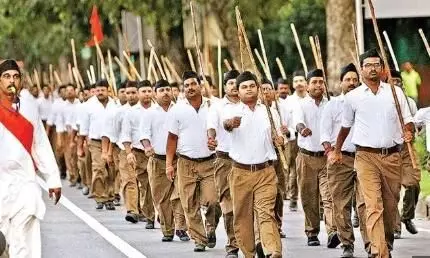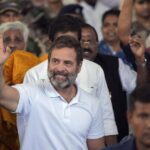By Sushil Kutty
The Cabinet Secretary can take part in RSS activities. So can those who answer to him and to other government officials and their subordinates. This happened when in one fell stroke the Modi government lifted the 58-year-old ‘ban’ on government employees participating in the activities of the RSS, which some say is a retrograde step.
With the ban gone, lots of babus can engage in the RSS way of “nation-building”. The Rashtriya Swayamsevak Sangh (RSS) is no longer toxic or taboo. There are millions of government employees who still won’t take part but there will be millions others who will jump at the opportunity.
India is a democracy and India has a Constitution with equal rights for all citizens including government ‘servants’. The ‘Chaparasi’, the lower division clerk and his upper division counterpart. And contrary to claims, the government has not stopped spreading its wings. The saying ‘minimum government, maximum governance’ is bull. Without government employees, both Centre and states will go kaput and private enterprise will come to a halting halt.
Keeping the RSS from meddling in government affairs called for the ban. A two-way street would have opened a thoroughfare for trafficking in “bigotry and hatred”, never mind it is only one side of the story. There is a solid chunk of citizenry which swears by the RSS and its rightwing ideology.
That said, lifting the ban was a “retrograde step”. Above all, an insult to the memory of Sardar Vallabhai Patel, who had a distinct vision for India’s Civil Services? A lot has changed since Sardar Patel’s passing, but the RSS, which was founded in 1925, hasn’t budged from its Hindutva stance. Does that explain why Prime Minister Narendra Modi has given his only real alma mater the benefit of doubt?
The pushback didn’t take long coming. Modi mandarins have been conveyed the “anguish and distress”. One missive read: “If what has been reported is factually correct, the said order makes a mockery of the vision of Sardar Vallabhai Patel, the architect of the civil services in India, of the role expected of civil services in the country.”
One media labelled the RSS an “edifice built on hatred and bigotry” and the ban wholly justified; meaning, at least on that score, government employees cannot take independent decisions – and their right of expression and speech stood cancelled or curtailed.
It is another matter that the government should have thought a hundred times before taking such a decision. The “edifice built on hatred” has for the first time in its existence gained respect. But for how long? If LoP Rahul Gandhi has his wish and topples Modi’s NDA government, the ban on government employees taking part in RSS activities would be back with a bang!
Meanwhile, there is no dearth of civil servants and ordinary “right thinking citizens” chaffing at the implications. What of the “apolitical, secular role” expected of government employees, who would be welcomed with glee by the RSS, of which Prime Minister Narendra Modi, and several of his colleagues in the BJP and government, was a part of?
The RSS has a clear-cut mission and vision: “Sangh-inspired institutions and movements today form a strong presence in social, cultural, educational, labour, developmental, political and other fields of nationalist endeavour.” Is it dormant intent or suddenly attainable statement of fact?
Lifting the ban on government employees taking part in RSS activities has opened up hitherto out of bounds vistas for the government, government employees and the RSS. Sardar Patel will be looking from the great height of the Statue of Unity and wondering why the sudden Modi largesse to the “edifice built on bigotry”?
That includes the Bharatiya Janata Party, nay the entire Sangh Parivar ecosystem, geared to strive for and attain RSS goals. “Social, cultural, educational, labour, developmental, political and other fields of nationalist endeavour” pretty much covers the gamut. Was lifting the ban instant or planned; perhaps, even a directive from the RSS?
Isn’t it a fact that the RSS has become politically very relevant in the decade since 2014? Won’t this Modi largesse give it further impetus? India’s Civil Services will gel more seamlessly with the RSS’s intent of purpose. The RSS ideology will permeate government-thinking and rightwing project implementation will get a never thought of intensity. Will civil services henceforth do the RSS’ bidding at the drop of barely a hint?
Sardar Vallabhai Patel had another vision. “I would advise you to maintain the utmost impartiality and incorruptibility of administration. A civil servant cannot afford to, and must not, take part in politics. Nor must he involve himself in communal wrangles. To depart from the path of rectitude in either of these respects is to debase public service and to lower its dignity,” India’s ‘Iron Man’ told young bureaucrats.
What does lifting the ban spell for “government functioning”? It is the same as what it will spell for the RSS? Both share similar outlook. With the ban lifted, what the RSS plans, the Modi government will put in place. There is a feeling Prime Minister Narendra Modi forgot his ‘Hindutva’ agenda and the RSS has a well-mapped path for India that is Bharat. There is a feeling the third Modi regime requires the firm and steadying hand of the RSS. (IPA Service)




 Rahul Gandhi’s Communications Strategy With Masses Is Doing Wonders
Rahul Gandhi’s Communications Strategy With Masses Is Doing Wonders 